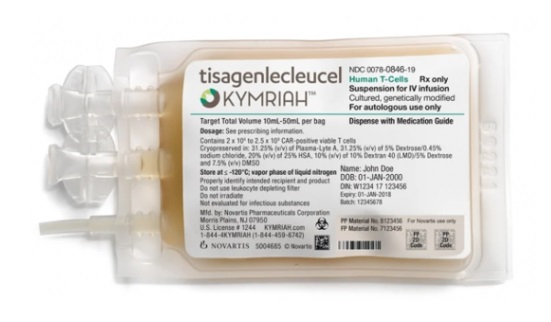An opposition lawmaker pushes to expand the number of medical institutions that can provide CAR-T therapies, including Kymriah, to treat cancer patients.

Rep. Shin Hyun-young of the Democratic Party of Korea (DPK) submitted a bill to amend the Act on Safety and Support for Advanced Regenerative Medicine and Biopharmaceuticals to the National Assembly on Thursday.
Kymriah, an anticancer drug, functions by eliminating cancer cells through the extraction of immune cells (T cells) from patients. These T cells are then engineered with "chimeric antigen receptors (CARs)" to prompt an attack against cancer cells before being reintroduced into the patient. The utilization of Kymriah requires medical institutions to collect and examine the patient's human cells, supplying them to pharmaceutical companies as raw materials.
However, the current process mandates that medical institutions be licensed to handle human cells for this purpose. Without proper licensing, the collection and testing of the patient's human cells become unfeasible, restricting the number of institutions capable of providing this treatment.
The proposed amendment eliminates the requirement for medical institutions to obtain a license for human cell management. Instead, it permits advanced regenerative medical institutions to engage in human cell management services as long as they supply cells derived from patients as raw materials for advanced biopharmaceuticals. This involves minimal operations such as separating, washing, freezing, and thawing, ensuring that the biological characteristics of the cells are maintained.
Kymriah, a cell therapy for recurrent blood cancer, carries a high cost, approximately 500 million won ($386,600). However, with health insurance coverage, the financial burden on patients has been reduced to 6 million won or less. Despite the still-elevated price, the limited availability of medical institutions offering this treatment has posed challenges for patients seeking access.
"The amendment is meaningful by opening the way for the use of up-to-date biopharmaceuticals for serious diseases, including cancer treatment," Rep. Shin said. "I hope it will help develop the biopharma industry and treat more patients.”
Related articles
- Following the US, Korean regulator obligates monitoring of CAR-T cell therapies
- [ESMO 2023] Has Korean CAR-T treatment Anbal-cel won the greenlight at ESMO?
- Curocell completes phase 2 study of CAR-T therapy for DLBCL
- Lawmaker casts doubt on effectiveness of 2 ultra-expensive drugs Kymriah, Zolgensma

